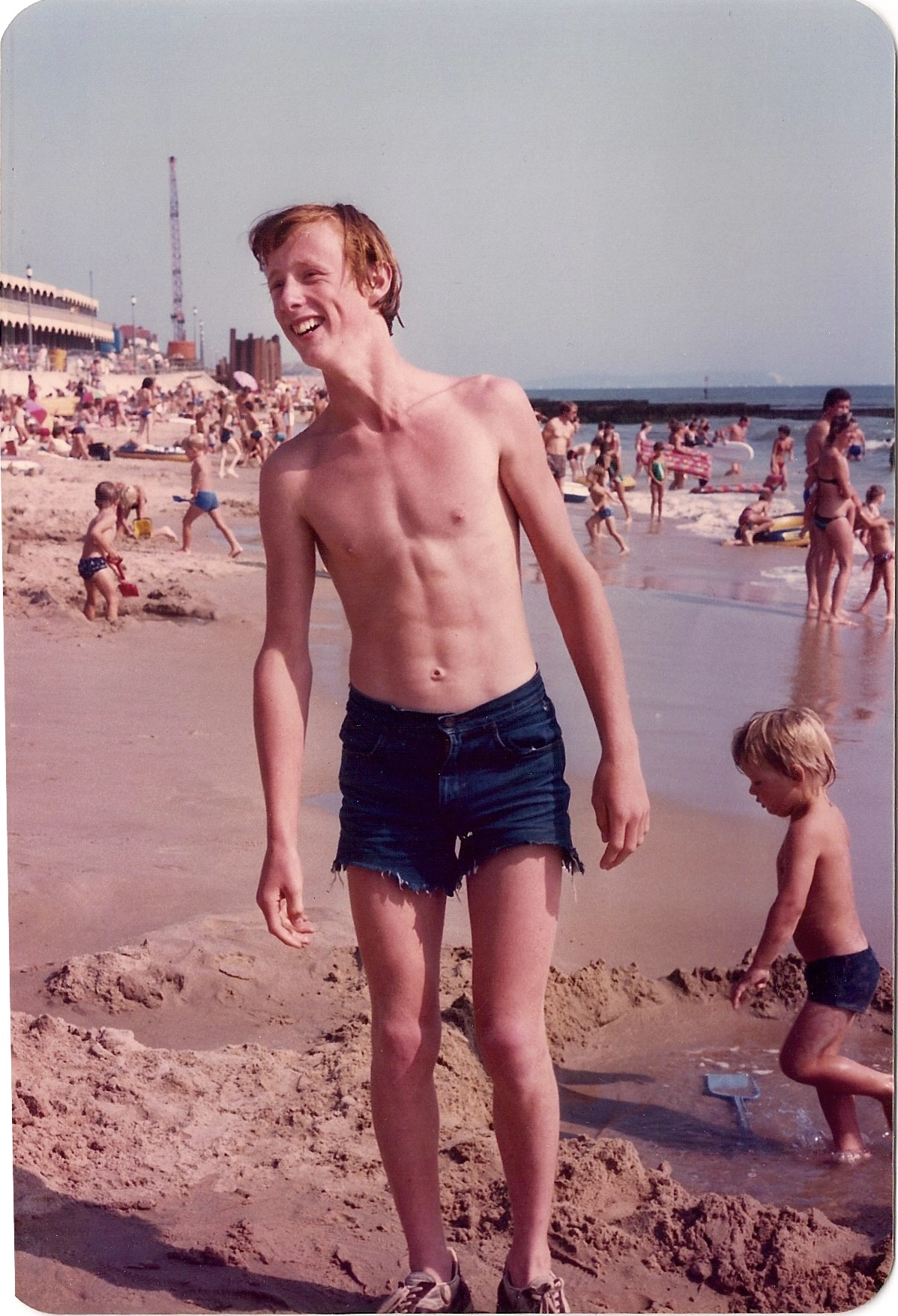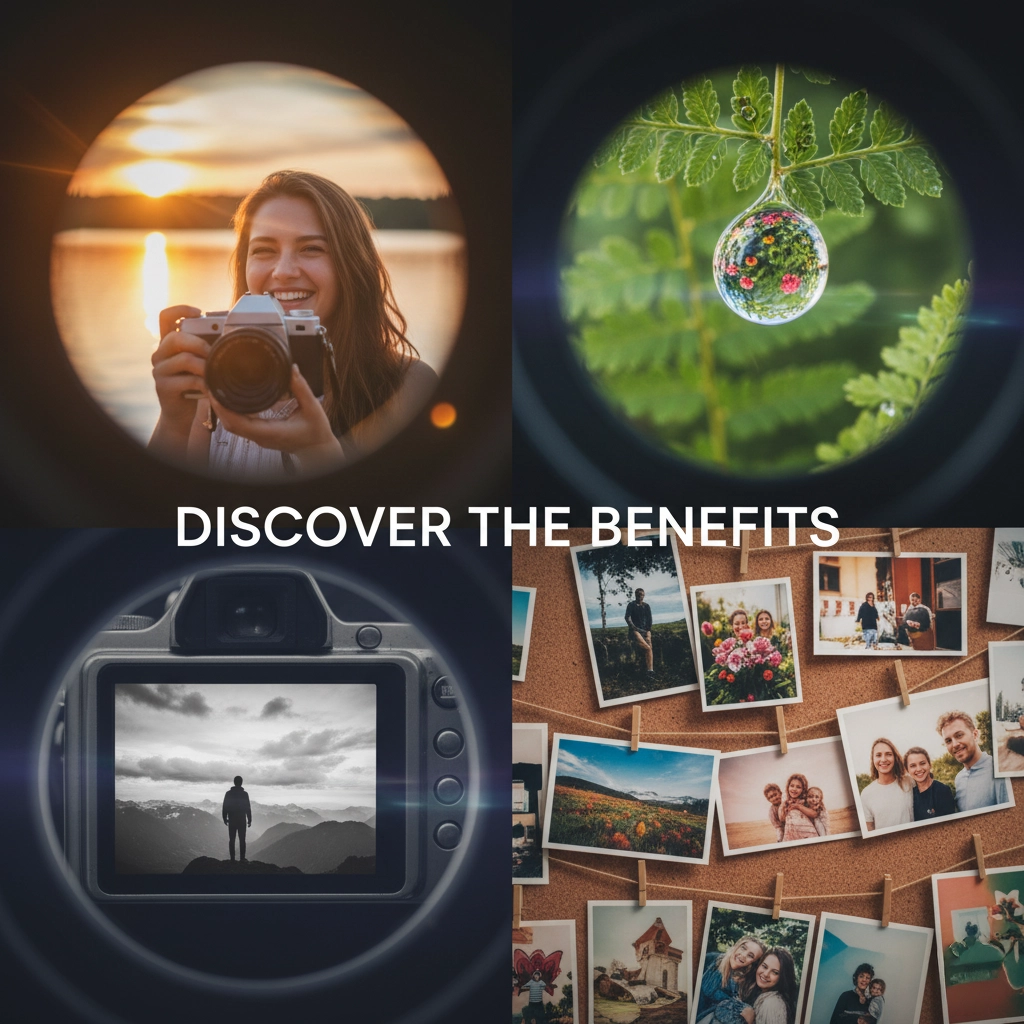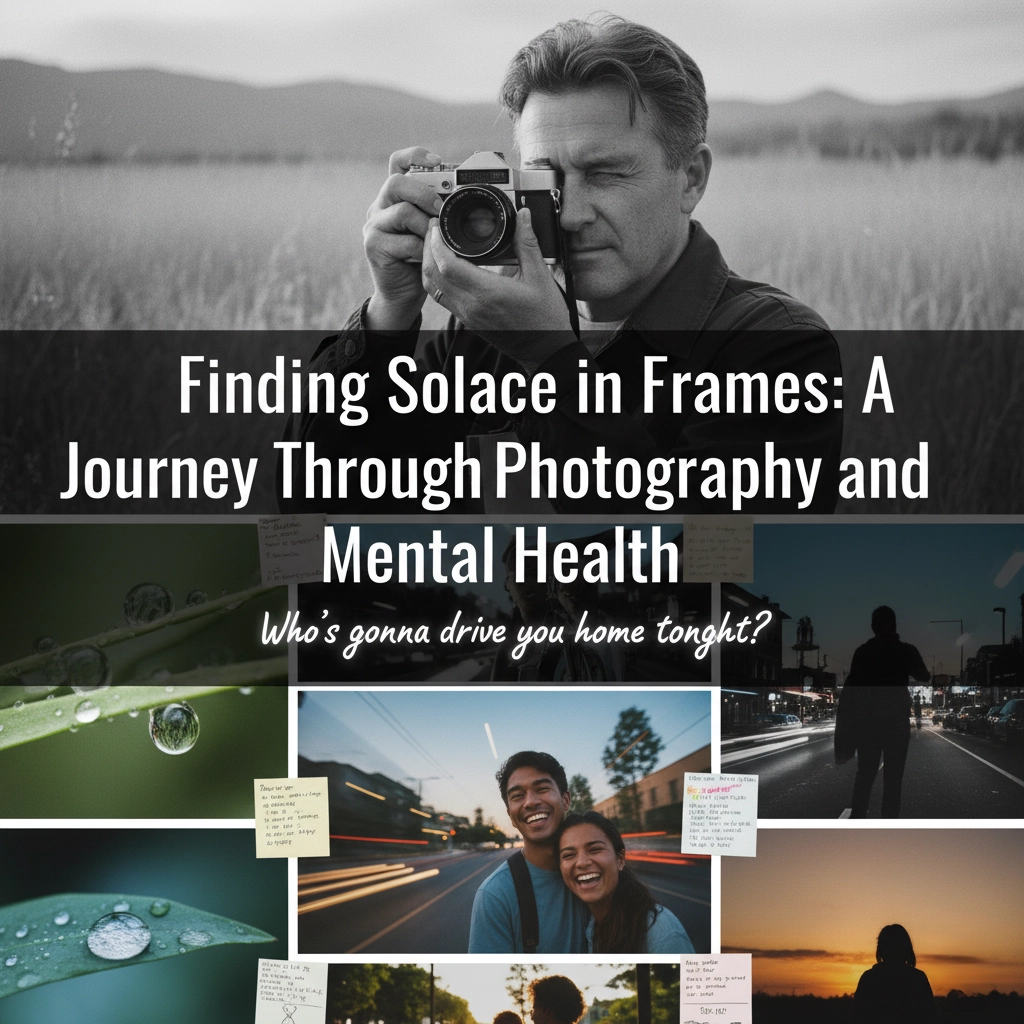In the depths of my struggles with depression and mental health, I discovered an unexpected source of solace and healing: photography. From my early teenage years to my current stage in life, in my mid-50s, the art of capturing moments has played a profound role in my emotional well-being and my understanding of the mental health benefits of photography. As I reflect on this transformative journey, the lyrics of “Drive” by The Cars resonate deeply, serving as a poignant reminder of the challenges we face and the support we need to overcome them.
So What Changed?

This is me circa 1983, and in this photograph, I see a version of myself that exudes happiness, vitality, and overall well-being, or at least that’s what I wanted to convey. Looking back, I realise that it was around the early 80s when significant changes, both physical and mental, started to shape who I would become. However, I’m naturally inclined to keep my personal stories to myself and those closest to me, as I’ve always been more of an introvert. If you’re reading this, you know who you are, and I appreciate (Love) your presence in my life.
Instead of delving into my personal journey, I’d like to focus on why I chose this particular photograph. Every aspect of it captures a sense of joy and youthful enthusiasm. It’s a snapshot that masks or at least suggests a story devoid of pain. As photographers, our role is often to narrate a tale through imagery.
During the 80s, the prevailing attitude towards mental health was one of ignorance and dismissal. People with mental health issues were either confined or handed a prescription, with the general sentiment being that there was something inherently wrong with them. This stigmatisation was, in my opinion, comparable to the challenges faced by individuals coming out as gay during that time. Such was the spirit of the 80s.
Today, there is a notable juxtaposition for those who understand the struggles of that era. Mental health awareness has become a prominent topic in the media, the workplace, and nearly every facet of life. Everyone seems to be talking about it and sharing their stories, their battles. And let me be clear, this is a positive and remarkable development.
While I won’t explicitly divulge the details of my personal mental health journey, I will share some insights I’ve gained along the way. I’ve discovered the profound benefits of photography as a therapeutic outlet and a means of expression. Through capturing moments and emotions behind the lens, I’ve found solace and a creative channel for processing my experiences. Additionally, one particular song that has resonated with me throughout the years is “Drive” by the Cars.
The lyrics of “Drive” by The Cars mirror the struggles faced by individuals battling drug abuse and mental illness. The song’s opening lines question who will provide guidance when it’s too late and acknowledge that things aren’t always great. It highlights the significance of seeking help and breaking free from the belief that nothing is wrong. The chorus reinforces the need to confront our struggles and actively reach out for support. “Who’s gonna drive you home tonight?” serves as a poignant reminder to recognise our vulnerabilities and find the strength to seek assistance. Lyrics ahead of there time?
Its lyrics and melody have served as a steadfast companion during difficult times, offering a sense of encouragement and drive to keep moving forward.
In the end, I firmly believe that each of us owns our mental health journey. It becomes a building block of coping and self-understanding. Although I may not openly share my personal narrative, I hope that by sharing these insights and the positive impact and health benefits of photography has on my well-being, it can inspire others to find their own avenues for healing and growth.
Who’s gonna tell you when It’s too late? Who’s gonna tell you things Aren’t so great? You can’t go on Thinking nothing’s wrong, oh oh Who’s gonna drive you home Tonight?
Song Lyrics
Unveiling the Healing Power of Nature

Nature became my ultimate muse, guiding me towards healing and providing a sanctuary for my troubled mind. Through my lens, I captured breathtaking landscapes, delicate flowers, and vibrant sunsets that whispered stories of resilience and hope. Whether I wandered through serene forests, hiked majestic mountains, or strolled along tranquil beaches, each photograph became a testament to the enduring beauty of the world and an affirmation of my own existence.
Photography as a Supportive Companion
During the darkest moments of my life, when I felt trapped in a seemingly endless abyss, my camera became a loyal friend, silently accompanying me through the ups and downs. It patiently listened to my unspoken sorrows and captured the raw emotions that words often failed to express. Behind the lens, I found solace and a sense of purpose. Through each click, I released the weight of my burdens and allowed my emotions to find their voice.
Photography as a Therapeutic Medium
Engaging in photography also became a form of therapeutic expression. I was still standing, still fighting. In capturing the essence of my own journey, I discovered the power of self-compassion and self-acceptance, nurturing a newfound sense of love and appreciation for myself.
Photography can have both advantages and disadvantages for mental health, depending on how it is utilized and the individual’s approach to it. Here are some of the main points:
Advantages of Photography for Mental Health:
- Creative Outlet: Photography provides a creative way to express oneself, which can be therapeutic and cathartic. It allows individuals to capture emotions, thoughts, and perspectives through images, which can be particularly beneficial for those who have difficulty expressing themselves verbally.
- Mindfulness and Presence: Engaging in photography often requires focus and attention to detail, which can help individuals become more mindful and present in the moment. This can be especially useful for reducing stress and anxiety.
- Stress Reduction: Taking photographs and immersing oneself in the process can be a form of relaxation, helping to reduce stress and tension. It allows individuals to momentarily escape from their worries and focus on something enjoyable.
- Self-Expression and Identity: Photography can serve as a means for individuals to explore their identity and emotions. Through the images they capture, they may gain insights into their feelings and experiences, leading to greater self-awareness.
- Social Connection: Photography can foster social connections and a sense of community. Joining photography clubs, participating in workshops, or sharing photos on social media platforms can create opportunities for interactions with others who share similar interests.
Disadvantages of Photography for Mental Health:
- Obsessive Behavior: For some individuals, photography can become an obsession, leading to excessive preoccupation with capturing images. This can lead to neglecting other aspects of life and relationships, which may negatively impact mental well-being.
- Comparison and Self-Esteem: Social media and photography platforms can sometimes lead to comparison with others’ work, potentially causing a decline in self-esteem if an individual feels inadequate or less skilled.
- Perfectionism: Striving for perfection in photography can be stressful and discouraging, especially when it interferes with enjoying the creative process. It may lead to frustration and self-criticism if the results don’t meet unrealistic expectations.
- Isolation: While photography can be a social activity, it can also lead to isolation if individuals spend excessive amounts of time alone, focusing solely on their photography pursuits and neglecting social interactions.
- Pressure to Perform: For professional photographers, the pressure to meet clients’ expectations or achieve recognition can lead to stress and burnout, affecting their mental health.
Overall, photography can have significant mental health benefits when practiced mindfully and in moderation. It’s essential to strike a balance and be aware of how photography impacts one’s well-being, making adjustments if necessary to maintain a healthy relationship with the art form.
A Renewed Perspective
Photography gradually shifted my perspective, allowing me to view the world through a different lens. As I focused on the intricate details of life—the delicate petals of a flower, the play of light and shadow—I began to appreciate the beauty in the ordinary. Through my photographs, I discovered hidden gems, moments of awe and wonder that I had overlooked in my daily struggles. Photography taught me to seek beauty even in the midst of chaos and find solace in the simplest of moments.
You can’t go on Thinking nothing’s wrong, oh oh Who’s gonna drive you? Who’s gonna drive Tonight?
Song Lyrics
Conclusion
The journey of embracing photography as a therapeutic tool has been transformative for my mental health. Through capturing the essence of nature’s serenity and exploring my inner self, I found healing, resilience, and a renewed sense of purpose. As the lyrics of “Drive” poignantly ask, “Who’s gonna drive you home tonight?” For me, it was the power of photography, the art that led me back to myself, whispered hope into my soul, and ultimately became my driving force.
Photography has taught me that sometimes, when we feel lost and overwhelmed, we need something outside of ourselves to guide us home. It could be the beauty of nature, the support of loved ones, or even a creative outlet like photography. Just as the song acknowledges the importance of someone who will be there to pick us up when we fall, photography became that unwavering companion in my journey towards mental well-being.
Through the lens of my camera, I discovered a newfound appreciation for the world around me. I learned to pay attention to the small details, the fleeting moments that often go unnoticed. Whether it was the delicate dewdrops on a spider’s web or the golden hues of a setting sun, photography invited me to slow down and savor the present. It became a powerful reminder that even amidst the chaos, there is still beauty to be found.
In the darkest moments of my struggles, photography acted as a form of self-expression. It allowed me to capture my emotions and release them into the world. The camera became a tool through which I could convey my pain, my joy, and everything in between. Each photograph became a visual diary, a testament to my resilience and a tangible representation of my journey towards healing.
Moreover, photography provided a sense of purpose and achievement. As I honed my skills and shared my work with others, I received validation and encouragement. The positive feedback I received ignited a spark of confidence within me, reminding me that my creativity and perspective mattered. It gave me a sense of pride and accomplishment, which helped to counteract the negative thoughts and doubts that often plagued my mind.
The song lyrics ask, “Who’s gonna hold you down when you shake? Who’s gonna come around when you break?” While photography couldn’t physically hold me, it held space for me. It provided a means to express my vulnerability and allowed me to confront my inner demons head-on.
Through the lens of my camera, I found healing, self-discovery, and a renewed sense of purpose. Photography became the driving force that led me home, back to a place of inner peace and contentment. It reminded me that even in the face of mental health struggles, there is resilience, strength, and beauty to be found.
As I continue my journey into my mid-50s, photography remains an integral part of my life. It has become not only a means of self-expression but also a way to connect with others who may be navigating similar challenges. Through sharing my photographs and the stories behind them, I hope to inspire others to find solace and healing in their own creative pursuits.
So, if you find yourself at a crossroads, unsure of who will drive you home tonight, consider the power of photography—or any creative outlet that speaks to your soul. Embrace the beauty of the world around you, capture moments of joy, and allow your creativity to guide you towards healing. Remember that you are not alone on this journey, and there is always a path back to the light.
FAQs: Health Benefits of Photography
- What are the benefits of photography for students?
Photography offers numerous benefits for students, including:
- Creative expression: Photography allows students to explore their creativity and develop a unique visual language. It provides a means of self-expression and allows them to communicate their thoughts, ideas, and emotions through images.
- Enhanced observation skills: Photography encourages students to pay attention to details, patterns, and compositions in their surroundings. It helps develop their observation skills and trains them to see the world from different perspectives.
- Improved visual literacy: By engaging with photography, students develop visual literacy skills, including the ability to interpret and analyse visual information. This skill is valuable in various fields, including art, media, design, and communication.
- Boosted self-confidence: As students learn and improve their photography skills, they gain a sense of accomplishment and pride in their work. Positive feedback and recognition for their photographs can significantly boost their self-confidence.
- Documentation and storytelling: Photography enables students to capture and document moments, events, and experiences. It serves as a powerful tool for storytelling, allowing them to convey narratives and share their unique perspectives.
- Why is photography important in life?
Photography holds significant importance in various aspects of life:
- Preserving memories: Photography allows us to capture and preserve special moments, milestones, and memories. Looking back at photographs evokes nostalgia and enables us to relive those cherished moments.
- Communication and self-expression: Images have a universal language that transcends barriers. Photography provides a means of communication and self-expression, allowing individuals to convey their thoughts, feelings, and experiences without words.
- Documentation and historical record: Photographs play a crucial role in documenting history, culture, and societal changes. They serve as visual records of significant events, people, and places, contributing to the collective memory of humanity.
- Artistic exploration: Photography is a form of artistic expression that enables individuals to explore their creativity, experiment with different techniques, and push the boundaries of visual aesthetics. It offers a platform for personal and collective artistic pursuits.
- Social commentary and advocacy: Photographs have the power to raise awareness, provoke emotions, and stimulate conversations. They can be used to shed light on social issues, advocate for change, and promote empathy and understanding.
- What are the mental benefits of photography?
Engaging in photography can have several positive effects on mental well-being:
- Stress relief: Photography serves as a mindful activity that allows individuals to focus on the present moment and immerse themselves in the creative process. It can serve as a form of meditation, providing a break from daily stress and promoting relaxation.
- Self-expression and empowerment: Through photography, individuals can express their emotions, perspectives, and personal stories visually. This creative outlet can provide a sense of empowerment, helping individuals cope with their emotions and navigate their mental health struggles.
- Increased mindfulness and awareness: Photography encourages individuals to observe and appreciate their surroundings more mindfully. It prompts them to pay attention to details, colours, textures, and compositions, fostering a greater sense of awareness and connection with the present moment.
- Emotional healing and reflection: Photographs can act as a visual diary, enabling individuals to process and reflect on their emotions and experiences. They can capture moments of joy, sadness, or personal growth, providing a tangible reminder of their emotional journey and promoting healing.
- Confidence and self-esteem: As individuals develop their photography skills and receive positive feedback on their work, it can boost their self-confidence and self-esteem. The act of creating something meaningful and receiving recognition for their artistic vision can have a positive impact on overall well-being.
- What are the social benefits of photography?
Photography offers several social benefits:
- Community engagement: Photography can bring people together who share a common passion for capturing images. It provides a platform for individuals to connect, collaborate, and engage with like-minded photographers, whether through local photography clubs, online communities, or workshops. This fosters a sense of belonging and encourages social interaction and networking.
- Cultural exchange and understanding: Photography allows individuals to capture and share diverse cultures, traditions, and perspectives. Through visual storytelling, it promotes cross-cultural understanding and appreciation, bridging gaps and fostering empathy among different communities.
- Documentation and advocacy: Photographs have the power to document social issues, raise awareness, and advocate for change. By capturing compelling images that shed light on important social, environmental, or humanitarian concerns, photographers can initiate conversations, mobilise communities, and inspire action.
- Communication and storytelling: Photography is a universal language that transcends barriers of language and culture. It enables individuals to convey stories, emotions, and experiences that can resonate with diverse audiences. Through their photographs, photographers can communicate narratives and perspectives that have the potential to evoke empathy, promote dialogue, and create connections.
- Shared experiences and memories: Photography facilitates the sharing of experiences and memories with others. Whether through personal photo albums, social media platforms, or exhibitions, photographs provide a medium for individuals to share their perspectives, adventures, and special moments. This strengthens social bonds, fosters connections, and cultivates a sense of community.
- Appreciation of beauty and diversity: Photography encourages individuals to explore and appreciate the beauty and diversity of the world. Through capturing images of landscapes, wildlife, people, or everyday objects, photographers can share their unique perspectives and invite others to see the world through their eyes. This promotes a deeper understanding and appreciation of the world’s richness and encourages individuals to celebrate diversity.
In conclusion, photography brings a myriad of benefits to individuals, ranging from personal well-being to social connection and engagement. It provides a creative outlet for self-expression, promotes mindfulness and reflection, and enables individuals to communicate, advocate, and connect with others. Whether pursued as a hobby or a profession, photography has the power to positively impact both the individual and the wider community.
Like what you read? Fuel my next post with a coffee – hit that PayPal button and keep the caffeine flowing!
[wpedon id=77]


No Responses